Srinagar: All the candle bearers, standing side by side, hand in hand, against the rapes, murders and blasts that hurt, kill and terrorise. All the debates, raising voices over one another, over what is right and what is wrong, who is right and who is wrong. All the protests, raising slogans and raising fingers, for peace between nations and nations against peace.
And yet there is no outrage for justice for the people sitting here in this corner of Pratap Park, Srinagar on the International Day of the Disappeared.
Since 1989 there are 10,000 cases of enforced disappearances, as claimed by the Association of Parents of Disappeared Persons (APDP) by the Indian army in Kashmir. 10,000 families are waiting for justice to be delivered to them. 10,000 families are yearning for their beloved ones, or at least for the news of their death.
Eight year old Irtiza accompanies her aged grandmother to ask questions about her uncle, who was taken by the Indian army from the street outside his home on 6 June, 1990.
“If my mamu was here, he would give me Eidi (money on Eid),” she says, with a longing in her eyes that tears into my skin like ice. Maybe one day she will begin to understand why her uncle is not there for her. Maybe one day she will accept her Eidi-less eid. But today she doesn’t. Today she has questions.
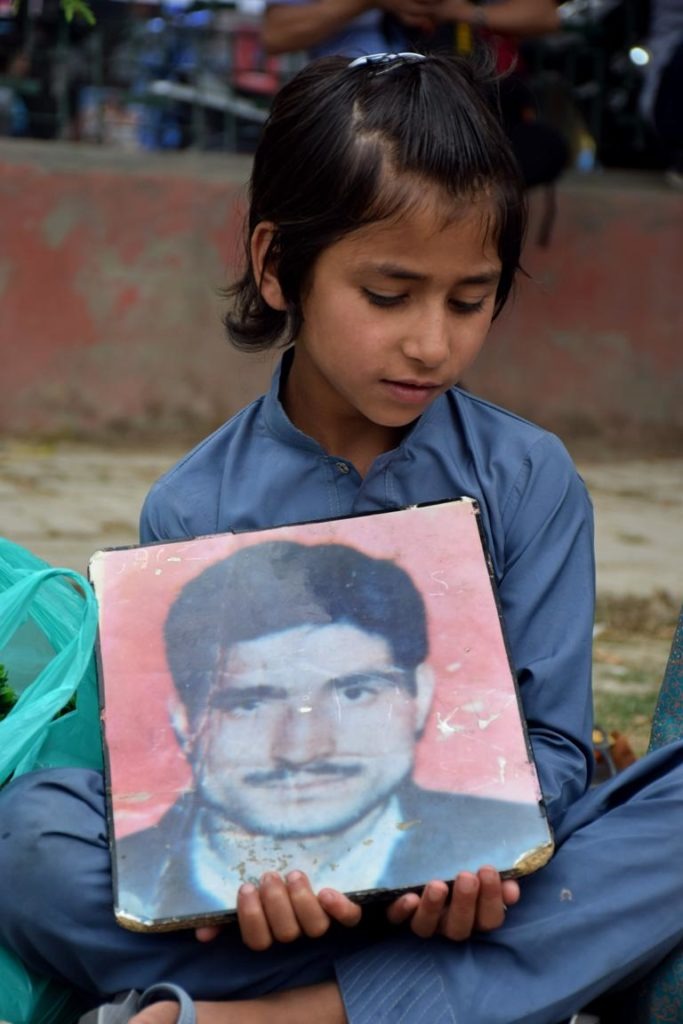
Irtiza holding the picture of her uncle during an APDP protest in Srinagar. (FPK Photo)
Her uncle, Rahat was the beloved brother of seven sisters. They lived a normal life in Kawoosa, Narbal.
On the day that is engraved in their memories the men in uniform took their only son, their only brother from the street outside his home, from the street he called home, from the street where he was supposed to live, love and dream.
Three years after his disappearance, his father died of a heart attack.
Since then his mother has been knocking on the doors of the police stations, begging for any information regarding her son.
It has been 27 years since her son went missing. She comes here every time there is a protest, and sits with the photograph of her son in her lap, hoping against hope that by some strange twist of events her son comes running towards her and holds her in his arms.
***
In any other scenario, you would have mistaken her for your grandmother. In any other scenario, she would have made you sit beside her and she would have narrated a story of a Persian prince and his Persian princess.
But this is not that scenario. This is not that grandmother.
This grandmother has a woeful tale of her life she has spent searching for her son, Manzoor.
She has two sons. Her younger son was at home when the army barged in and took him away. She ran after them, asked them to stop, and asked them why they were taking him away from her. They said it is for verification.
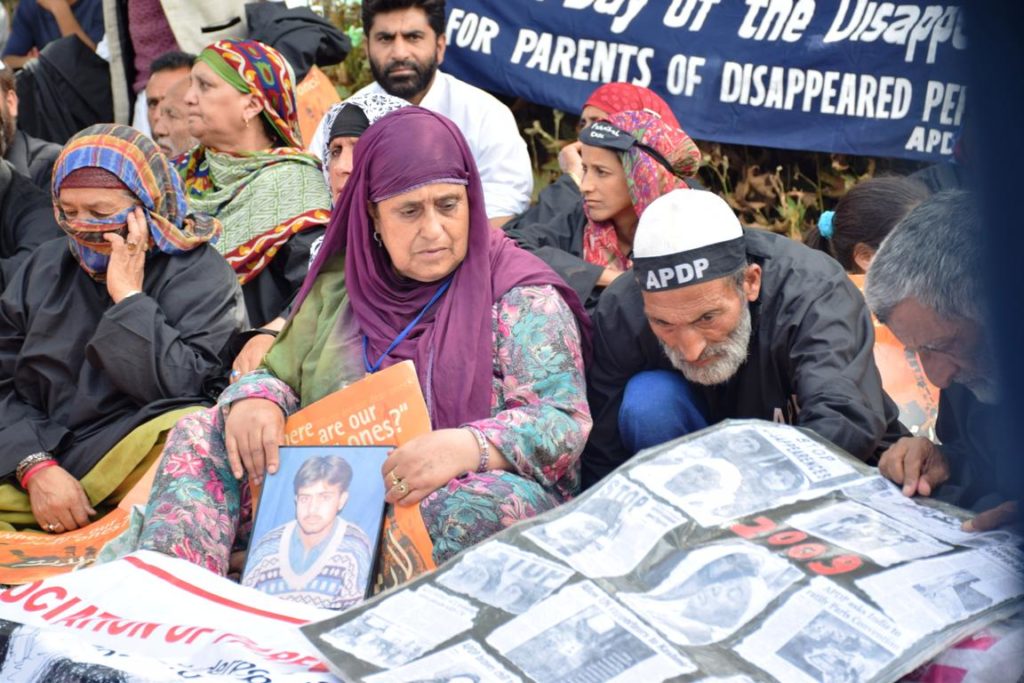
Since 2003, Manzoor’s mother joins her ‘new family’ in search of her ‘old family’. (FPK Photo)
She searched for him in the police stations of Safakadal, Chattabal and Zainakadal. She begged them to release her son. They said they will not release him till she hands over her elder son, Manzoor to them.
She told them to go ahead and search for him. Her elder son went to the police station. She begged him to take someone along with him. She begged him to not go. But he went, alone and unafraid.
That was a fateful day in the year 2003. He hasn’t been back since.
‘If he is alive, return him to me. If he is dead, please tell us so that we can learn to have our peace’ she says and breaks down.
She has a sick husband at home.
***
There is a frail old man, sitting alone with a passport size photograph in his hands. This photograph is all he has left of his precious son, Mohammed Lateef.
He has come all the way from Uri, 110km from Srinagar to protest the disappearance of his son. 20 years ago army knocked on his door and took away his son, without any reason or explanation.
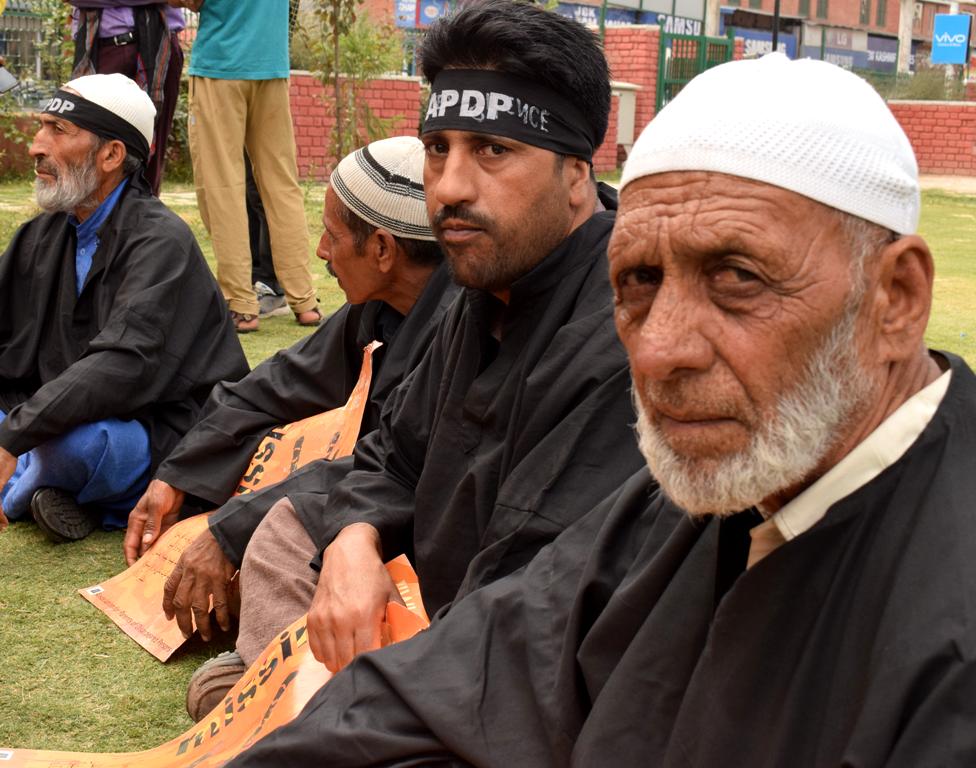
Father of Mohammad Lateef, who came all the way from Uri to register his protest. (FPK Photo)
He started searching the jails of Kashmir for his son. In the beginning they even denied that they have him in custody, he says.
It has been 20 odd years and he still isn’t given a single explanation about why he was arrested or where he is kept. He has no clue if his son is alive or dead. Facing nothing but disappointments from every corner, he comes here to share his pain with the people going through the same.
***
Any girl, in any corner of the world has dreams and ambitions. She also has a dream, a dream to find her brother who disappeared in 1992 from his home in Kupwara.
In the years after his disappearance his father started the search for him. ‘He used to come here and take part in these protests.’ She says.
After the death of her father, she is carrying on the legacy, her inherited search for her brother. ‘We have no support, none at all. I have one more brother who is a psychiatric patient.’ She says. ‘If he is alive, return him to us. If he is dead, please tell us. That’s all we are asking for.’ She adds.
***
“Abdul Ahad Ganie, my husband disappeared at the start of the militancy,” says a middle aged woman from Baspora, Soura.
Her son was two years old and her daughter was only a couple of months old.
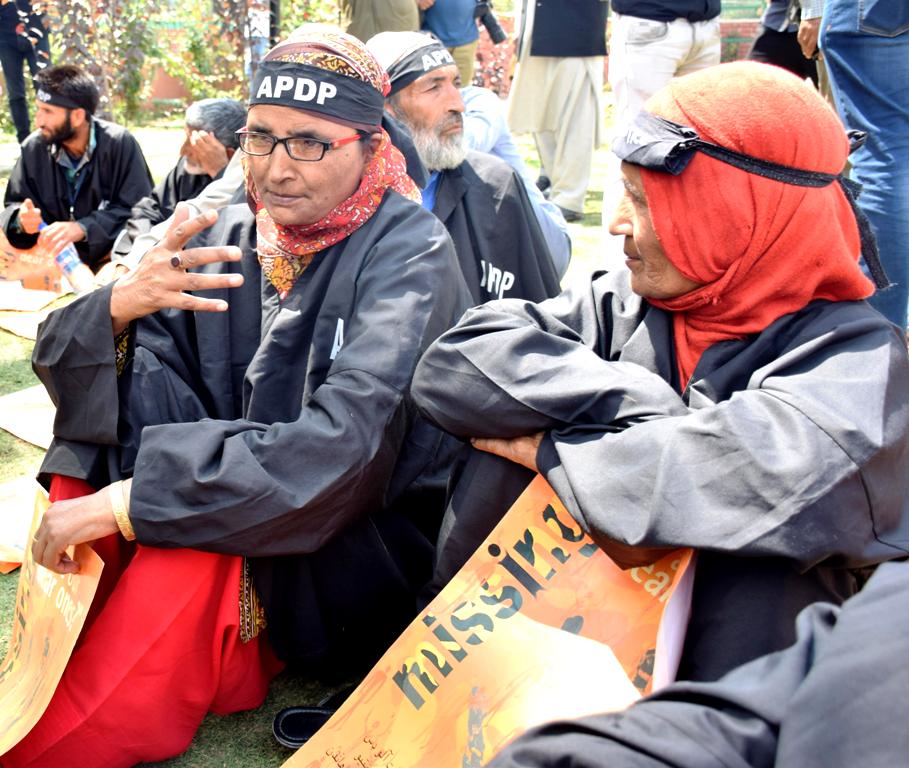
For Ganaie’s wife, the search is yet to end. (FPK Photo)
A young woman with two young kids and a missing husband, there was no one to show her the way. There was no one to tell her where to go, whom to approach.
‘Where could I have gone with my two children tagging along?’ she asks. I had no reply.
***
Chairman of Jammu and Kashmir Liberation Front Yasin Malik, who attended the sit-in said, “The families and neighbours of these disappeared persons are witness that they are taken by the government forces but there has been a constant denial by the forces.”
Parveena Ahanger from Association of Parents of the Disappeared Persons led this sit-in, where people from far off places came to remind the world that they are still waiting for justice.
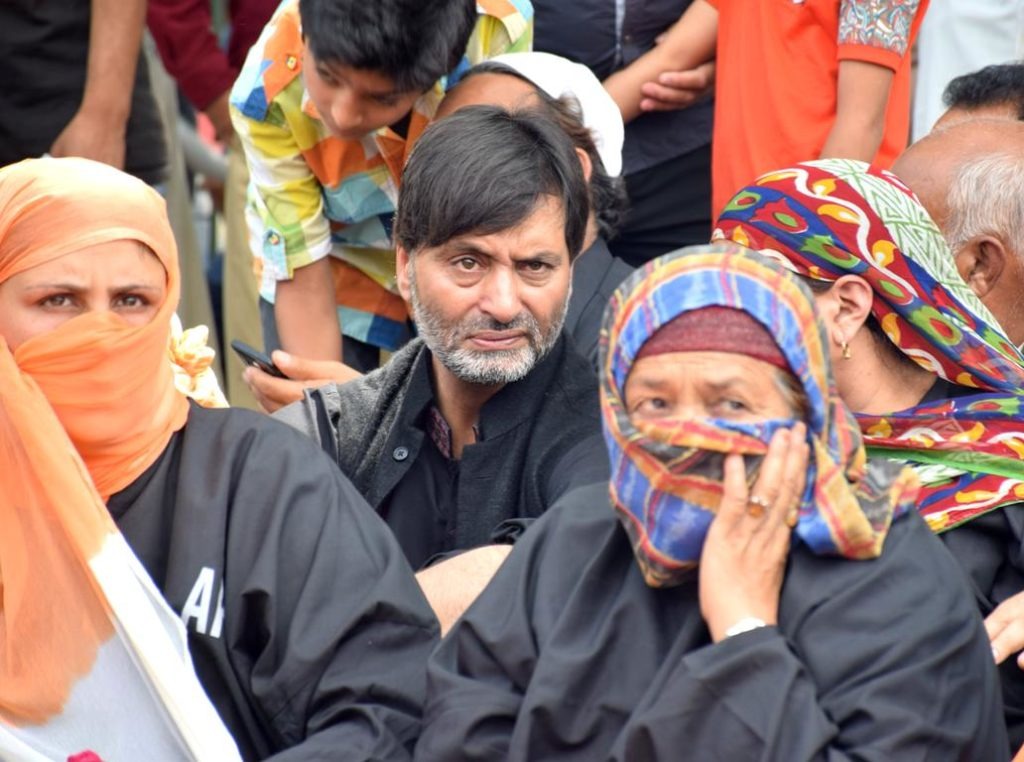
JKLF Chief Yaseen Malik. (FPK Photo)
It has been so many years, yet these people still come here every time there is a protest. They come because this is all they have now, their inherited search for their sons, husbands and fathers and the comfort they find in the company of each other.
“This is my family now,” says one lady, referring to the other members of APDP, Association of Parents of the Disappeared Persons.
The photographs that they hold in their hands will fade away someday, but their memories will not. Dying is easy. At least you know what tragedy struck. What kills them everyday is not knowing what happened to the people that mean the world to them.








